新概念英语第一册117课课件
合集下载
Lesson117(课件)新概念英语第一册
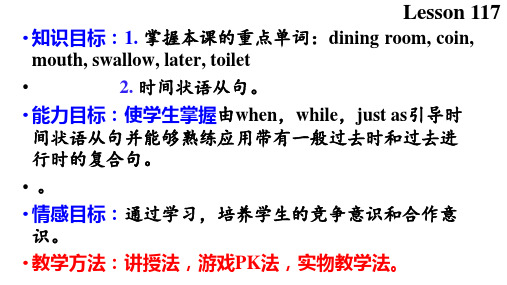
翻译下列句子。 • 1. 当我到达时,她正在做饭。 • When I __a_r_ri_v_e_d_, she_w_a_s___ _c_o_o_k_in_g_ a meal. • 4. 当我读书时,我妈妈正在做饭。 • _W__h_i_le____I was reading , • my mother __w_a_s_____ __c_o_o_k_i_n_g_____.
• A. him B. his
C. himself D. it
• (A) 4. Have you ever _______ Shenzhen?
• A. been to B. gone to C. went to
D. gone in
• (C ) 1. When he _______ I _______ a bath.
do housework
phone me from the office
一、选择题
• (C) 1. I _______ my pen everywhere but I couldn’t _______ it.
• A. looked for, found
B. found, looked for
• C. looked for, find
•。
• 情感目标:通过学习,培养学生的竞争意识实物教学法。
翻译下列句子。 • 1. 当我到达时,她正在做饭。 • When I ________, she______ _______ a meal. • 2. 当我读书时,我妈妈正在做饭。 • _________I was reading , • my mother _________ _____________.
While ... have breakfast, Tommy, find two small coins
新概念英语第一册117课课件45358教学教材
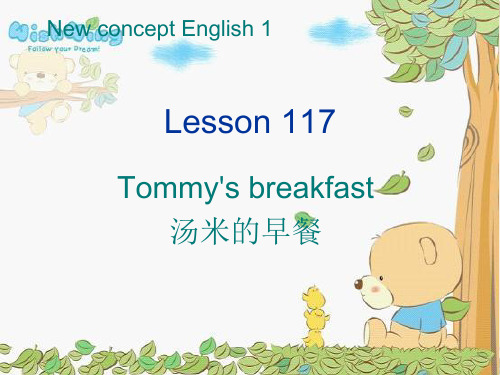
在分词
Theyห้องสมุดไป่ตู้were not watching TV. 3、疑问句:was/were + 主语+ 现在
分词
Was he writing a letter last night?
❖ 常用时间状语
When, while, a moment ago, from nine to ten last evening, at that time ❖ when既指时间点,也可指一段时间, while只指 一段时间,因此when引导的时间状语从句中 的动词可以是终止性动词,也可以是延续性动 词,而while从句中的动词必须是延续性动词。
o’clock last night.
Practice Time!
1. While she ___ TV, Penny ___ asleep.
A. watches, was falling B. was watching, fell C.was watching, was falling D. watch, fell KEY: B
7. Mike and I___(play) basketball at that time yesterday afternoon.
课文讲解
❖ When my husband was going into the dining room this morning, he dropped some coins on the floor.
❖ There were coins everywhere. We looked for them, but we could not find them all.
❖ everywhere 到处 ❖ look for 寻找(强调动作和过程) ❖ find 找到 (强调寻找的结果) ❖ 我找遍了任何地方都找不到我的钢笔。
Theyห้องสมุดไป่ตู้were not watching TV. 3、疑问句:was/were + 主语+ 现在
分词
Was he writing a letter last night?
❖ 常用时间状语
When, while, a moment ago, from nine to ten last evening, at that time ❖ when既指时间点,也可指一段时间, while只指 一段时间,因此when引导的时间状语从句中 的动词可以是终止性动词,也可以是延续性动 词,而while从句中的动词必须是延续性动词。
o’clock last night.
Practice Time!
1. While she ___ TV, Penny ___ asleep.
A. watches, was falling B. was watching, fell C.was watching, was falling D. watch, fell KEY: B
7. Mike and I___(play) basketball at that time yesterday afternoon.
课文讲解
❖ When my husband was going into the dining room this morning, he dropped some coins on the floor.
❖ There were coins everywhere. We looked for them, but we could not find them all.
❖ everywhere 到处 ❖ look for 寻找(强调动作和过程) ❖ find 找到 (强调寻找的结果) ❖ 我找遍了任何地方都找不到我的钢笔。
新概念英语第一册117课课件(共47张PPT)

Lesson 117
Tommy's breakfast
汤米的早餐
New words
dinning room ['dainiŋ'ru:m] 饭厅
coin [kɔɪn]来自n.硬币mouth [maʊθ]
n.嘴
swallow ['swɔləu] v.吞下
later ['leɪtə] adv.后来
toilet ['tɒɪlɪt] n. 厕所,盥洗室
twice three times four times 9. while 10. when
7.去过某地 8. 一次
二次 三次 四次 9. 正当…时 10.什么时候/何时/ 当…时
Phrases
1. 走进… 2. 走出… 3.寻找(强调找的动作过程)
找到(强调找的结果) 4.把…放入…里 5.(两者)都
There were coins everywhere. We looked for them, but we could not find them all.
Language points
2. there were coins everywhere.
复合不定代词
Every
No
Any
Some
One Thing Body
Everyone No one Everything Nothing Everybody Nobody
Anyone Someone Anything Something Anybody somebody
We looked for them, but could not find them all.
主句为一般过去时表示比较短晢的动作或事情
Tommy's breakfast
汤米的早餐
New words
dinning room ['dainiŋ'ru:m] 饭厅
coin [kɔɪn]来自n.硬币mouth [maʊθ]
n.嘴
swallow ['swɔləu] v.吞下
later ['leɪtə] adv.后来
toilet ['tɒɪlɪt] n. 厕所,盥洗室
twice three times four times 9. while 10. when
7.去过某地 8. 一次
二次 三次 四次 9. 正当…时 10.什么时候/何时/ 当…时
Phrases
1. 走进… 2. 走出… 3.寻找(强调找的动作过程)
找到(强调找的结果) 4.把…放入…里 5.(两者)都
There were coins everywhere. We looked for them, but we could not find them all.
Language points
2. there were coins everywhere.
复合不定代词
Every
No
Any
Some
One Thing Body
Everyone No one Everything Nothing Everybody Nobody
Anyone Someone Anything Something Anybody somebody
We looked for them, but could not find them all.
主句为一般过去时表示比较短晢的动作或事情
新概念英语第一册117-118课课件

• 当她正在打扫房间的时候,她的丈夫给她打了 电话。
• While she was cleaning the room, her husband telephoned her.
• 当孩子正在花园玩的时候,开始下雨了。 • As the children were playing in the garden, it
单词学习
• dinning room(hall) • coin • mouth • swallow • later • toilet
饭厅
n. 硬币 n. 嘴 v. 吞下 adv. 后来 n. 厕所,盥洗室
• swallow • ① v. 吞下,咽下
• Tommy swallowed the coins. • ② v. 抑制,使不流露
• 此句是过去进行时,结构是was/ were+ doing • 表示过去某个时刻正在进行或发生的动作。
过去进行时
• 构成 • was/ were + 现在分词 • 否定句式:在was/ were的后面加not • 疑问句式:把was/ were提前 • I was doing my homework this morning. • I was not doing my homework this morning. • What were you doing this morning?
A is doing B. has done C. was doing 6.Mrs White ___B__dinner when her son came home.
A. is cooking B. was cooking C. are cooking D. were cooking
• I tried hard to swallow my doubts. • 我强忍着不露出怀疑的神色。 • 她忍住没笑,静静地坐在那里。
• While she was cleaning the room, her husband telephoned her.
• 当孩子正在花园玩的时候,开始下雨了。 • As the children were playing in the garden, it
单词学习
• dinning room(hall) • coin • mouth • swallow • later • toilet
饭厅
n. 硬币 n. 嘴 v. 吞下 adv. 后来 n. 厕所,盥洗室
• swallow • ① v. 吞下,咽下
• Tommy swallowed the coins. • ② v. 抑制,使不流露
• 此句是过去进行时,结构是was/ were+ doing • 表示过去某个时刻正在进行或发生的动作。
过去进行时
• 构成 • was/ were + 现在分词 • 否定句式:在was/ were的后面加not • 疑问句式:把was/ were提前 • I was doing my homework this morning. • I was not doing my homework this morning. • What were you doing this morning?
A is doing B. has done C. was doing 6.Mrs White ___B__dinner when her son came home.
A. is cooking B. was cooking C. are cooking D. were cooking
• I tried hard to swallow my doubts. • 我强忍着不露出怀疑的神色。 • 她忍住没笑,静静地坐在那里。
新概念英语NCE1_lesson117-118-119课件

the room.
•
她正在擦鞋时,乔治敲门了。
•
Just as she was cleaning her shoes, George knocked at
the door.
•
我做饭时,他正在花园里劳作。
•
While I was cooking the dinner ,he was working in the
• When I left, it began to rain. • When I saw him, he was drinking some tea. • 当我到达伦敦的时候,天黑了下了。 • 昨天晚上十点我正在看电视. • 当Mary正在做早饭的时候,我正在看报纸
过去进行时
• 概念:
•
1、在过去某个特定的时间正在进行或发生的动作。
•
2、当过去的一个动作发生的时候另外一个动作正在
进行。
• 结构:
•
S+ was(were)+ doing
•
S+ wasn’t(weren’t) +Ving
•
Was(Were) +S +Ving?
•
I was reading a book at 7 o’clock yesterday.
•
I wasn’t reading a book at 7 o’clock yesterday.
★swallow v. 吞下
•
① v. 吞下,咽下
•
Tommy had swallowed the coins.
•
② v. 抑制,使不流露
•
She swallowed a smile and sat there still.
新概念英语第一册117课 课件(共17张PPT)
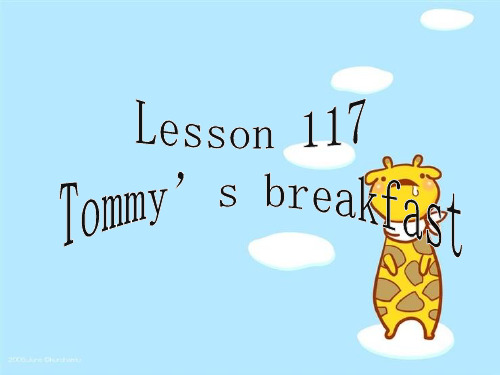
• 4. The boss arrived when she was typing a letter.
• 5. The train left when I was buying the tickets.
• 6. It rained heavily when I was driving to London.
A. is having B. have C. has D. was having
4. What ____ you ____from 7 to 9 yesterday ? A. were, doing B. did. do C. have, done
5.Look! Lily with her sister __ a kite on the playground.
shaving
cut
Exercise P239
• 1. He knocked at the door when I was answering the phone.
• 2. He came downstairs when I was having breakfast.
• 3. The phone rang when I was washing the dishes.
过去进行时VS现在进行时
结构
现在am/is/are+v-ing 过去was/were+v-ing
The students are drawing pictures now.
The students were drawing pictures when the teacher came in.
3.时间状语:
New words and expressions
dining room
• 5. The train left when I was buying the tickets.
• 6. It rained heavily when I was driving to London.
A. is having B. have C. has D. was having
4. What ____ you ____from 7 to 9 yesterday ? A. were, doing B. did. do C. have, done
5.Look! Lily with her sister __ a kite on the playground.
shaving
cut
Exercise P239
• 1. He knocked at the door when I was answering the phone.
• 2. He came downstairs when I was having breakfast.
• 3. The phone rang when I was washing the dishes.
过去进行时VS现在进行时
结构
现在am/is/are+v-ing 过去was/were+v-ing
The students are drawing pictures now.
The students were drawing pictures when the teacher came in.
3.时间状语:
New words and expressions
dining room
新概念英语第一册第117-118课课件
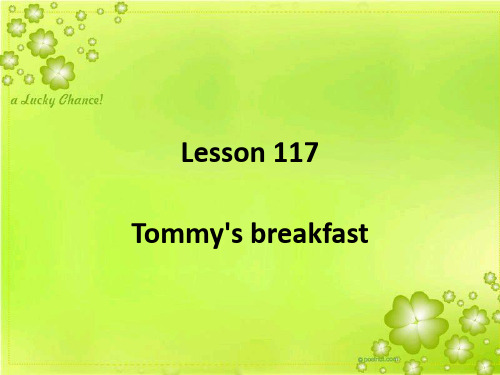
mouth n. 嘴
• • • • • • • • Open your mouth. 嘴里塞满食物时不要说话。 Don’t talk with your mouth full! It sounds funny in your mouth. 这种话由你的口中说出来,听起来就很可笑 a useless mouth光吃不做的人, 饭桶 a big mouth[美俚]碎嘴子; 说话冒失的人; 爱吹牛, 说大话的人 Tom was born with a silver [golden] spoon in his mouth.汤姆生 于富贵之家。 • from hand to mouth 勉强糊口 • from mouth to mouth口口相传的
• He put them both into his mouth. We both tried to get the coins. But it was too late. Tommy had already swallowed them! • put sth +介词短语 把…东西放在… • 把书放在桌子上 • Put the books on the desk. • both表示“两个都…” • 他们俩都想去法国。 • They both want to go to France. • 三者或三者以上用all • 他们大家都幸福 • They were all happy.
• • • • • •
• • • • •
2.表示过去某一阶段一直在进行的动作。 他们昨天在等你。 They were waiting for yesterday. 她去年在写一部小说。 She was writing a story last year. 3.表示从过去某一个时间的角度看将要发生的 动作,用于某些瞬间动作;go, come, leave, stay, fly 等。 几天后他们要离开。 They are leaving in a few days. They were leaving a few days later. 他告诉我他的哥哥要到苏州去。 He told me that his brother was going to Suzhou.
新概念英语第一册第117-118课课件(全).ppt

• look for 寻找,强调动作。look是不及物动词。 • find 找到,强调结果。find是及物动词。
例:He looked for his pen everywhere, but he couldn’t find it. • them all =all of them 例:We all like apple. = All of us like apple.
Key words&expressions
★dining room • dining table • sitting room / living room • bedroom • kitchen • balcony • garden
饭厅,餐室 餐桌 客厅 卧室 厨房 阳台 花园
Key words&expressions
• drop: 掉下
•
丢失,丢掉 I dropped my pen at school.
Language points
2.There were coins everywhere. 复合不定代词
Language points
3. We looked for them, but could not find them all.
• 4. Jim! _________ is waiting for you at the school gate.
• 5. In spring, _________ begins to grow.
• 6. There is _________ knocking at the door. Please go and see who it is.
我们搭晚一点的火车吧。
Key words&expressions
例:He looked for his pen everywhere, but he couldn’t find it. • them all =all of them 例:We all like apple. = All of us like apple.
Key words&expressions
★dining room • dining table • sitting room / living room • bedroom • kitchen • balcony • garden
饭厅,餐室 餐桌 客厅 卧室 厨房 阳台 花园
Key words&expressions
• drop: 掉下
•
丢失,丢掉 I dropped my pen at school.
Language points
2.There were coins everywhere. 复合不定代词
Language points
3. We looked for them, but could not find them all.
• 4. Jim! _________ is waiting for you at the school gate.
• 5. In spring, _________ begins to grow.
• 6. There is _________ knocking at the door. Please go and see who it is.
我们搭晚一点的火车吧。
Key words&expressions
新概念英语第一册117课课件
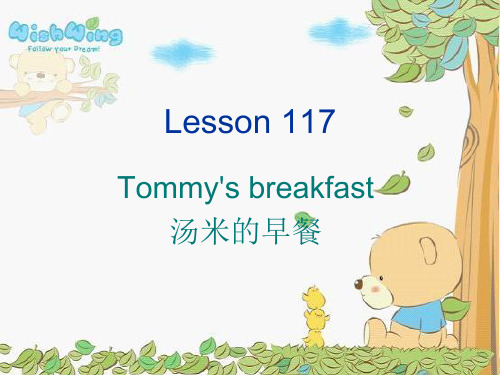
常用时间状语 When, while, a moment ago, from nine to ten last evening, at that time
when既指时间点,也可指一段时间, while只指 一段时间,因此when引导的时间状语从句中 的动词可以是终止性动词,也可以是延续性动 词,而while从句中的动词必须是延续性动词。
He
put them both into his mouth. We both tried to get the coins. But it was too late. Tommy had already swallowed them! put sth +介词短语 把…东西放在… 把书放在桌子上 Put the books on the desk. both表示“两个都…” 他们俩都想去法国。 They both want to go to France. 三者或三者以上用all 他们大家都幸福 They were all happy.
Lesson 117
Tommy's breakfast 汤米的早餐
Dining room(hall) 饭厅
Living room
起居室,客厅
Bedroom
卧室
Bathroom
洗浴室,卫生间
Kitchen
厨房
n. 硬币(可数名词) e.g. Every coin has two sides. 每个事物都有两面性。 mouth n. 嘴 e.g. Don‟t talk with your mouth full!
later
1) adv. 后来,较迟地,较后地 e.g. three days later 三天后 e.g. He came later than usual. 他比平常来得晚。 2)adj. 较迟的,较后的,更近的。 e.g. Let‟s take a later train. 我们搭晚一点的火车吧。 drop v. (意外)掉落;使掉落 e.g. A drop in the bucket/ocean.
新概念英语第一册117-118课PPT

• 3.leave, arrive, start, die 等用在过去进行时表 示“快要完成,即将…”。而用在一般过去时 当中则表示“己经完成”。 • 火车快要停了。 • The train was stopping. • 火车停了。 • The train stopped.
• ⑴ I saw Lisa in the street yesterday,but she didn’t see me . • She the other way. (2008年,徐州) • A. was looking B.is looking C.looked D.has looked • ⑵—What did the teacher say just now? (2008年,河南) • --Sorry, I didn’t catch it.I something else. • A.think B.will think • C.was thinking D.had thought • ⑶I___my homework while my parents____TV last night. (2006年,南 京) • A.did;have watched B.was doing;were watching • C.had done;were watching D.would do;were watching • ⑷—Did you see the traffic accident yesterday? (2005年,苏州) • --Yes.It happened when I_______past the museum. • A.walk B.am walking C.will walk D.was walking
coin /kɔin/ n. 硬币 a silver coin 银币 你能把这个一美元的纸币换成硬币吗? Could you change the one-pound note into coin? mouth /mauθ/ n. 嘴 Open your mouth.
新概念英语第一册第117课(课堂PPT)

16
117课 过去进行时练习: 一、仿照例句用所给 的词汇造句。
1. I, see him, he, cross the street I saw hi m while he was crossing the street. (He was crossing the street when I saw him.) A. the sun, shine, we, come out B. she, study at college, the war, break out C. she, work in a factory, the city, be liberate d (放) D. he, lose his pen, he, go sightseeing in th e city
17
1. While we __________ (wait) for the bus, a girl __________ (run
) up to us.
2. I __________ (telephone) a friend when Bob __________ (com
e) in.
3. Jim __________ (jump) on the bus as it __________ (move) aw
1
阅读课文回答问题
What does the she mean by ‘change’ in the last sentence ?
2
再看一遍课文
3
When my husband was going into the dining room this morning
4
he dropped some coins on the floor.
117课 过去进行时练习: 一、仿照例句用所给 的词汇造句。
1. I, see him, he, cross the street I saw hi m while he was crossing the street. (He was crossing the street when I saw him.) A. the sun, shine, we, come out B. she, study at college, the war, break out C. she, work in a factory, the city, be liberate d (放) D. he, lose his pen, he, go sightseeing in th e city
17
1. While we __________ (wait) for the bus, a girl __________ (run
) up to us.
2. I __________ (telephone) a friend when Bob __________ (com
e) in.
3. Jim __________ (jump) on the bus as it __________ (move) aw
1
阅读课文回答问题
What does the she mean by ‘change’ in the last sentence ?
2
再看一遍课文
3
When my husband was going into the dining room this morning
4
he dropped some coins on the floor.
新概念1 Lesson117-118课件
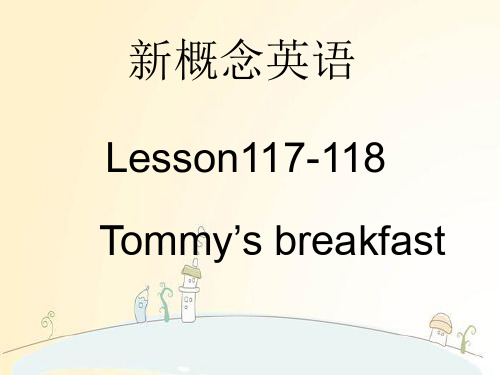
Tommy’s been to= has been to 现在完成时 去过
课文解析
• When my husband was going into the dining room this morning, he dropped some coins on the floor.
• While we were having breakfast, our little boy, Tommy, found two small coins on the floor.
• 4. The bread was very hard and I couldn't
(吞下)it.
• 5.Open your
(嘴)and say“Ah...”.
• 6.There are some
(硬币)on the table.
• 7.The old man s
on the street and broke his leg.
课文解析
• While we were having breakfast, • our little boy, Tommy, found two
small coins on the floor.
while 当.....时 Tommy 是the little boy 的同位语
课文解析
He put them both into his mouth. We both tried to get the coins, but it was too late. Tommy had already swallowed them!
small coins on the floor.
He put them both into his mouth. We both tried to get the coins, but it was too late. Tommy had
课文解析
• When my husband was going into the dining room this morning, he dropped some coins on the floor.
• While we were having breakfast, our little boy, Tommy, found two small coins on the floor.
• 4. The bread was very hard and I couldn't
(吞下)it.
• 5.Open your
(嘴)and say“Ah...”.
• 6.There are some
(硬币)on the table.
• 7.The old man s
on the street and broke his leg.
课文解析
• While we were having breakfast, • our little boy, Tommy, found two
small coins on the floor.
while 当.....时 Tommy 是the little boy 的同位语
课文解析
He put them both into his mouth. We both tried to get the coins, but it was too late. Tommy had already swallowed them!
small coins on the floor.
He put them both into his mouth. We both tried to get the coins, but it was too late. Tommy had
新概念英语第一册第117课完整ppt课件

精选ppt
阅读课文回答问题
What does the she mean by ‘change’ in the last sentence ?
精选ppt
再看一遍课文
精选ppt
When my husband was going into the dining room this morning
精选ppt
续的或同时发生的,那么主从句的动词都可用过去
进行时。
精选ppt
本课语法过去进行时
1.过去进行时由“主语+was/were+动词ing”构成 2.过去进行时的否定式由“主语+was/werenot+现 在分词”构成 3.过去进行时的疑问式由“was/were+主语+现在 分词”组成 句型 肯定句=主语+was/were+doing+其它 否定句=主语+was/were+not+doing+其它 一般疑问句问语=Was/Were+主语+doing+其它 答语:Yes,Iwas/were.或No,Iwasn't/were’t. 特殊疑问句=特殊疑问词精+选p一pt 般疑问句+其它
精选ppt
本课语法
1.look for,寻找(强调动作过程);find,找到(强调寻找的结 果)。 2.Tommy had already swallowed them! 汤米已经把硬币咽了下去 句中用了过去完成时形式 had swallowed。过去完成时用来表示过去 两个动作中发生在前的那个动作。显然,句中咽下硬币的动作发生在 夫妇俩能够把硬币从汤米手中抢过来之前。 3.later that morning,那天上午的晚些时候。 later是副词late的比较级。 4.any change change是个多义词,既有“零钱”的意思,也有“变化”的意思。此 处既可指“硬币”;也可指“情况的变化”。这是双关(pun /p)n/) 修辞法。
阅读课文回答问题
What does the she mean by ‘change’ in the last sentence ?
精选ppt
再看一遍课文
精选ppt
When my husband was going into the dining room this morning
精选ppt
续的或同时发生的,那么主从句的动词都可用过去
进行时。
精选ppt
本课语法过去进行时
1.过去进行时由“主语+was/were+动词ing”构成 2.过去进行时的否定式由“主语+was/werenot+现 在分词”构成 3.过去进行时的疑问式由“was/were+主语+现在 分词”组成 句型 肯定句=主语+was/were+doing+其它 否定句=主语+was/were+not+doing+其它 一般疑问句问语=Was/Were+主语+doing+其它 答语:Yes,Iwas/were.或No,Iwasn't/were’t. 特殊疑问句=特殊疑问词精+选p一pt 般疑问句+其它
精选ppt
本课语法
1.look for,寻找(强调动作过程);find,找到(强调寻找的结 果)。 2.Tommy had already swallowed them! 汤米已经把硬币咽了下去 句中用了过去完成时形式 had swallowed。过去完成时用来表示过去 两个动作中发生在前的那个动作。显然,句中咽下硬币的动作发生在 夫妇俩能够把硬币从汤米手中抢过来之前。 3.later that morning,那天上午的晚些时候。 later是副词late的比较级。 4.any change change是个多义词,既有“零钱”的意思,也有“变化”的意思。此 处既可指“硬币”;也可指“情况的变化”。这是双关(pun /p)n/) 修辞法。
